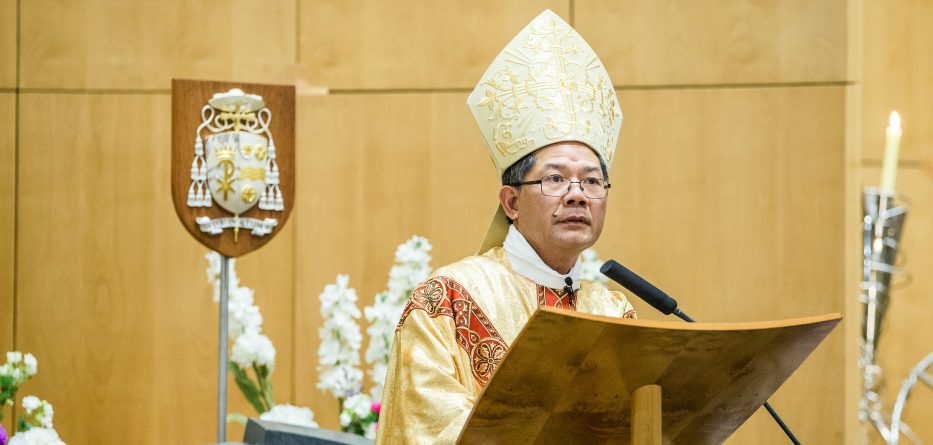Most Reverend Vincent Long Van Nguyen OFM Conv DD STL, Bishop of Parramatta
Homily for Mass of the Ordination to the Diaconate of Roderick Pirotta, Roque Dias, John Cinya and Thong Nguyen at St Patrick’s Cathedral, Parramatta
22 February 2019
Dear friends,
This evening, we have come to pray for these men who are to be ordained as married deacons.
They have discerned the call to serve in the second half of life and responded generously in tandem with their spouses and children.
I am proud to say that our diocese is now home to one of the most diverse and dynamic groups of permanent deacons in Australia. They are drawn from vastly different backgrounds and greatly enrich the life of the Church in Parramatta. I am convinced that this is the sign of the times when Christian ministries are increasingly reimagined and revitalised by way of relational maturity, mutuality, collaboration and accountability rather than privilege, elitism and individualism.
We celibate clergy have a lot to learn from these men as they seek to embody the ideal of Christian service not only in how they minister but also in how they nurture their relationships.
Today, the Church celebrates what is known as the Chair of St Peter, which is a symbol of our unity. It is perhaps the vestige of the old monarchical model of Church with the chair being the equivalent of the king’s throne. The chair in Latin is “cathedra” from which we derive the word “cathedral”.
These days, popes travel in the popemobile. However, up until the 70s they were actually carried on a ceremonial throne shouldered by a dozen men. The pomp and circumstance would have made the Roman emperors feel envious. Thank God, these symbols of power and splendour are gone.
Pope Francis shocked the world by waiting in line to pay for his hotel bill, after his election. When I was invited to Santa Marta, I saw him with my own eyes how he waited patiently for the lift to his room, just like everyone else. These gestures would have been unthinkable.
The Word of God today calls us to follow the humble, suffering and servant-like Jesus. In the Gospel, Peter is asked the crucial question as to who he thought Jesus was. “You are the Christ, the Son of the living God” he answered. Peter was initially praised for giving the right answer. Jesus called him the rock on which he would build the Church. However, as it turned out, Peter’s understanding was shallow or indeed erroneous. He wanted to remove the cross from the mission of Christ and Christian discipleship. The rock can be either the corner stone or the stumbling block. So long as Peter lived out the call to emulate the Suffering Servant, he was the rock of strength. But when he refused to be part of Christ’s suffering, he would become the rock of offence. Indeed, Peter would soon be rebuked and called a stumbling block precisely because he wanted to all the gain without the pain.
Peter had a steep learning curve on his way to be the foundation stone for the Christian community. Like Paul falling from his high horse on his way to Damascus, Peter also had his pride and ambition checked. He learned the lesson of humility in a transforming way. The risen Jesus told him that he would be led to places he’d rather not go. This is reference to the challenges that Peter could only overcome with the courage of vulnerable trust, faith without sight, strength without violence and love without counting the cost.
In the second reading, Peter alludes to the lesson he had learned. “I am a witness to the sufferings of Christ” he says. It is a summary of what it means to be a disciple. It is the prism through which we Christians see fellow human beings. Peter would later learn to overcome his own prejudices and expand the boundaries of love and acceptance by way of accepting Gentiles into the Christian community.
Dear friends,
In many ways, the Church today is being led to places that we’d rather not go. It is a big mess that we have found ourselves in and the summit in Rome is an indication of how far we have fallen.
Yet it is not a time for despair or worse scapegoating. Rather, it is precisely in this time of humility that we must have the courage to go back to the raw canvas of the Gospel. We do so by reclaiming not the former prestige and affluence, but the essential quality for Christian living and witness. We simply must make the cross of Christ and the discipleship of powerlessness and vulnerable trust the cornerstone of the Church again. Only by standing on the side of the powerless and the vulnerable, only by living authentically the call to poverty, simplicity and humility can our voice be credible, and our trust regained.
If the experience of the pilgrim people in the Old Testament is any guide, it is the journey and not the destination that shapes the soul. And the exodus often at its most assiduous, most trying, and soul-searching is paradoxically the most formative and life changing.
Perhaps, the meaning we ought to learn is that we abandon whatever is contrary and obstructive to the Gospel of love, compassion and vulnerability.
“The Son of Man came not to be served but to serve and give his life for many”. Let these words, John, Roderick, Thong and Roque be your motto of life especially as deacons. Let it guide your ministry and form you as ministers of the Gospel. May you not be afraid to make up all that has still to be undergone by Christ for the sake of his body the Church, and in this way become true servants in the manner of the suffering Servant of God.








